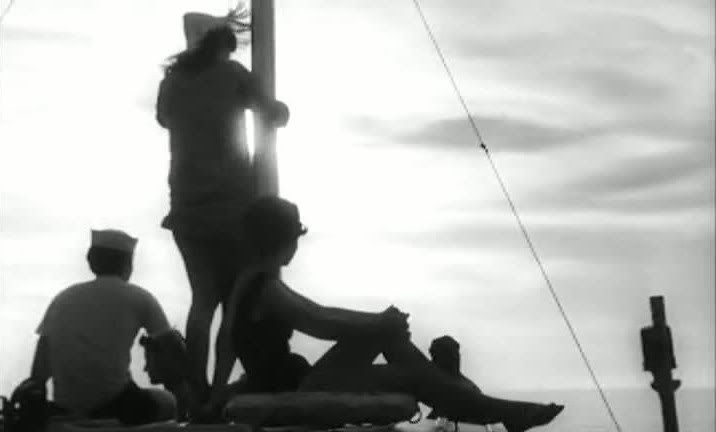
Adieu Philippine is a forgotten classic of the French New Wave, a marvelous, free-spirited film that hasn't received anywhere near the acclaim of the contemporaneous early offerings of the more famous New Wave filmmakers. It was the first film of Jacques Rozier, shot in 1960 and only finished in 1962 due to production difficulties. Though Rozier is far from a household name in comparison to the other New Wave directors — indeed, after this film failed he didn't make another feature for over ten years — this debut deserves to be mentioned along with Breathless and The 400 Blows as a remarkably assured and joyous first leap into filmmaking. It's a loose and improvisational film, shot like many of the other early New Wave films on the fly, in the streets and anywhere a camera could be quickly set up. Frequently, in the outdoor shots, passersby openly gape at the camera, stopping to stare, and Rozier mirrors this acknowledgment of the film's artifice in the metafictional, semi-documentary sequences that take place at a TV studio, where the film's central character Michel (Jean-Claude Aimini) works as a camera assistant. The film's credits roll, in staggering stop/start fashion, over a sequence set in the TV studio, where everyone is bustling around, rolling cameras frantically around the set, punching the sound in and out as they film a jazz combo performing. In the midst of this chaos, Michel fixes on a pair of cute girls gawking outside, Liliane (Yveline Céry) and Juliette (Stefania Sabatini), and invites them in to watch. Indeed, whenever the TV crew is filming, there are always people standing by and watching, and at one point Michel stumbles into a shot, walking across the frame of a melodramatic period costume drama, looking stupidly into the camera in his white t-shirt and jeans, an intruder from the modern era, from outside the narrative, like all the random people who Rozier's camera captures in the streets around his protagonists.
That loose sensibility winds through the film, giving it a jazzy, spirited vibe as Michel flirts with both girls, trying to decide who he wants more, as the girls, inseparable best friends, engage in a competition that's initially friendly and joking, but soon gives way to jealousy and hurt feelings. This love triangle drama, played lightly but with real feeling, plays out against the constant threat of the Algerian War: Michel knows that he will soon be summoned for the draft, and that promise of the future lingers over the entire film as an inescapable climax. The girls try to get him out of the draft, but their plans quickly peter out and Michel, for his part, seems fatalist about the whole thing, viewing his future service as an unavoidable destiny. With this fate hanging over him, Michel hangs out with his buddies, buys a car with them to pick up girls, plots to break into commercial filmmaking, and finally decides to go on vacation while waiting to be called up for the military.
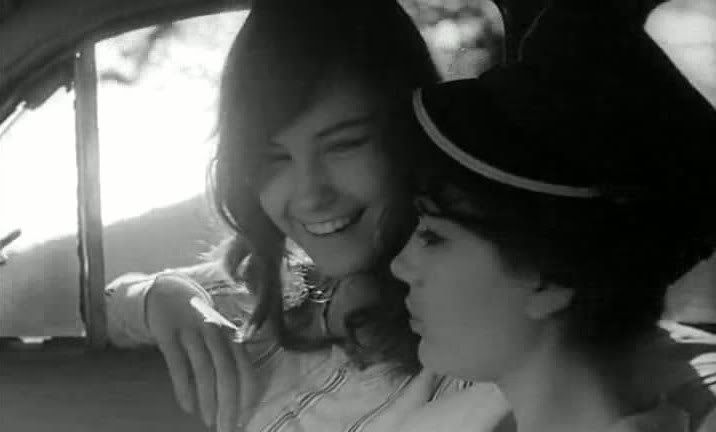
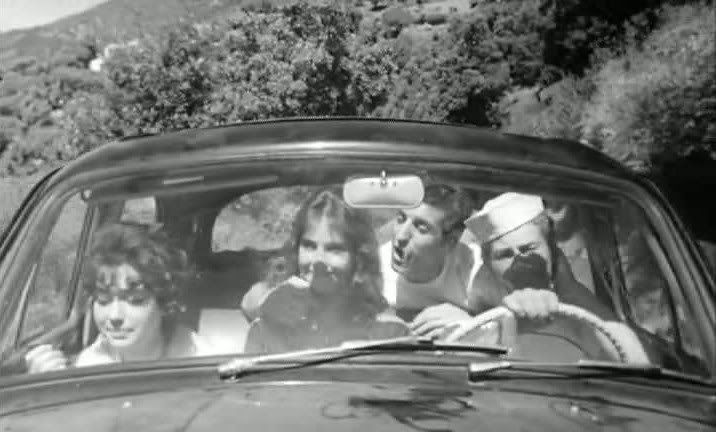
The film has a casual, episodic feel that befits its amateur shoot and its mostly inexperienced cast of non-actors, the bulk of whom never acted in another film before or after this one. It feels like a film of observation, of documentary, observing the life of this young military-age man in the months before he's sent to war. The film's joyful tone and light sensibility thus seem fragile, subject to shattering at any moment, and there's a current of mournfulness running through everything that happens, as though the film is simultaneously a celebration of and an elegy for the freedom and serenity of youth. The film's characters are young and innocent, and their flirtations and their dalliances are inflected with that innocence; Michel genuinely can't decide which girl he likes best, and indeed he seems to like them best together, while the girls try to tell themselves that they're not taking any of this too seriously, that it's all just a game. In any event, their friendship and their affairs seem to have an expiration date as Michel's impending enlistment approaches.
Nevertheless, Rozier keeps the tone predominantly airy and fun, with a strong thread of humor. Liliane's employer, the producer Pachala (Vittorio Caprioli), is especially humorous as a parody of the commercial aspects of the cinema — both literally, in the sense that he makes advertisements, and metaphorically as an icon of all the money-men and dishonest manipulators serving as middle-men in the film industry. Rozier had his own troubles with producers — Adieu Philippine languished unfinished for nearly two years due to conflicts over money, and only the intervention of Rozier's famous friend Godard could marshal the production support necessary to finish the film — and his mockery of Pachala is a hilarious, biting commentary on the intersections of art and commerce.
Pachala (played, perhaps not coincidentally, by one of the few professional performers in the cast, an Italian actor who worked with Rossellini and Fellini) fancies himself an artist, but in fact he just makes lousy commercials and rips off his collaborators, disappearing whenever he owes some money. A shoot for an arctic-themed refrigerator commercial with a flimsy igloo is a comedy of errors, reflecting Pachala's odd choices of details to get concerned with: he shrugs off the fact that there's a palm plant in the supposedly snowy set, but gets fixated on the store owner's refusal to remove his tie while posing as an Eskimo. Even better is the scene where he shows a detergent sponsor the rushes for another commercial the girls starred in, and there doesn't seem to be a usable take — one where the girls aren't giggling uncontrollably or knocking over detergent boxes — in the whole reel, as Pachala sinks lower and lower in his seat next to his corporate sponsor. Later, Pachala shows up again as a producer of "photo-romans," narrative sequences of still photos, with a sleazy interest in baring the breasts of his actresses and a corresponding disinterest in the niceties of historical recreation; he just shrugs it off when modern boats show up in the backgrounds of his photos of supposedly ancient subjects. He's a hilarious character, a target of rich mockery every time he shows up on screen.
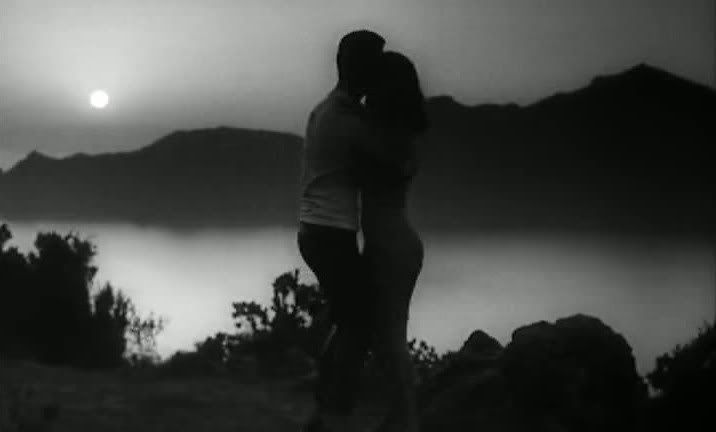
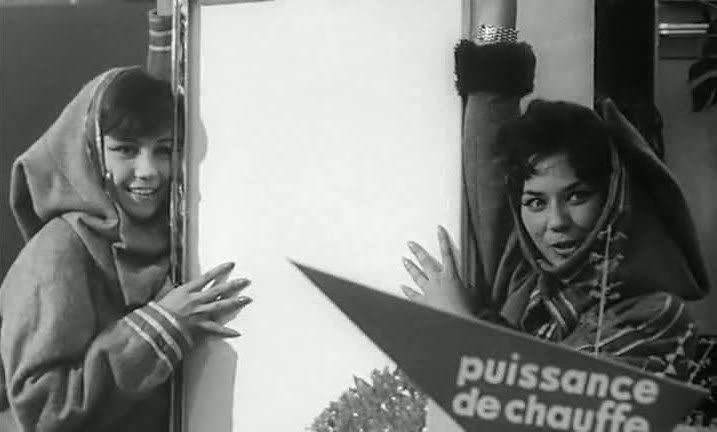
To some extent, Pachala's corrupt business practices and inconsistent mise en scène are contrasted against the joyful, of-the-moment attitudes of the young people — and against Rozier's own partially improvised, free-wheeling methods. Pachala represents the old ways, the tradition, the closed system of money and patronage in which young artisans like Michel and his friends are simply exploited and cheated. The film's tribute to the young is thus a tribute to the New Wave itself, in opposition to those vested interests, to the cheesy production values of the costume dramas that Michel works on or the silly commercials and trashy quasi-porn of Pachala. Adieu Philippine is something else altogether, like Breathless and The 400 Blows and the other early works of the New Wave, films with life and energy in every frame.
Rozier's images are at times sweepingly romantic, particularly when the central trio go away on vacation to Corsica — a last vacation, it seems, before adulthood and responsibility. There are so many great scenes here, so many wonderful moments, like the sequence where Liliane is serenaded by a hitchhiker and slow-dances with him, silhouetted against a foggy valley with the moon a distant glowing coin in the hazy night. There's also a meditative boat ride with the three principals filmed from behind, their faces towards the sun. More often, they're facing the camera, and their faces say a lot, even in the scenes where Rozier — who used primitive sound equipment and post-dubbed almost everything — omits the dialogue from the soundtrack. The faces of the girls, especially, are expressive and unforgettable, ranging from their giggly camaraderie and sly smiles of complicity to their moments of melancholy quiet and pensiveness. Everyone gives endearing amateur performances, witty and vibrant, and there's a sense of playfulness in all of the actors, as well as in the jagged camerawork and uneven sound, which mixes on-the-street verité with studio dubbing. The film has a real sense of physicality and corporeality, whether in the TV studio sequences of the first half or the seashore idyll of the second half, in which Rozier potently captures the feel of the sun and the ocean, the girls in their bikinis and one-pieces, the laughter and jealous rivalry during the car rides along scenic winding roads that crawl, serpent-like, towards no place in particular.
Still, throughout this scenic and spirited movie, a troubling scene from earlier lingers in the memory: one of Michel's friends has just returned from the army and from Algeria, and when Michel asks about it, the friend simply refuses to talk about it. It's just a single line, a momentary pause in the midst of the young man's joyous homecoming, but it reverberates with all the unspoken torment of the war, all the things that these characters are so intent not to address, to erase in pleasure and play. Politics enter the film explicitly only in a single scene in which Michel's family discuss technology, China and economics in a manner very familiar from any family's dinner table political discussions. It has that feel of real working class people glossing over these massive international topics with their rhetoric and their insistent if incompletely informed opinions. If the rest of the film never addresses politics explicitly, never discusses the Algerian War in any detail, the war and its effects on generations of young French men remain the subtext of nearly every scene. The war makes the characters' youthful games finite, sets an end date for their flings and their destination-free wanderings, and in that respect Adieu Philippine is about growing up into the world, about how the political affects even those who steadfastly ignore anything political, as these characters do. More than that, though, the film is about the joy of youth, about the joy of simply living. In its sensuality, its offhanded beauty, its extraction of the grace to be found in the quotidian, Adieu Philippine provides a more complete rejection of the ethos of war and death than any more explicit commentary could.









0Awesome Comments!